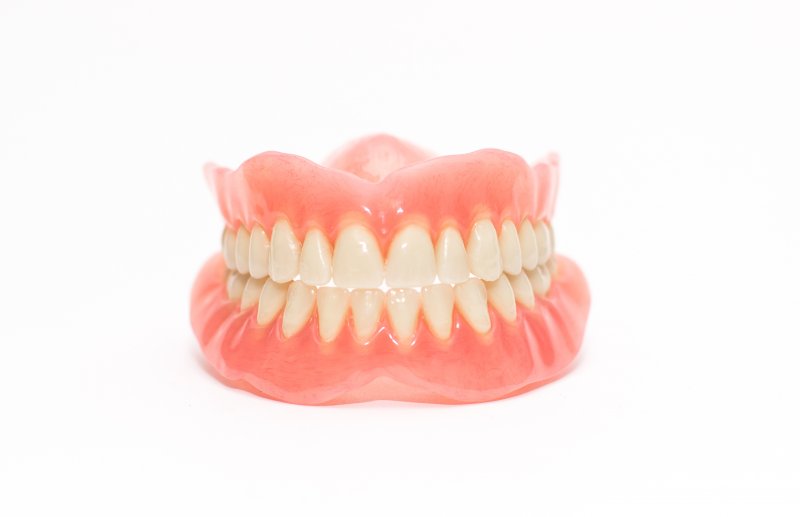You probably see dentures as a convenient way to fill the gaps in your mouth. They restore your smile, let you talk and eat with a full set of teeth, etc. What’s not to like? However, research shows that dentures can also harm your nutrition. That said, is there any way to overcome this effect?
The short answer to that question is “yes.” For a longer answer, here’s a summary of how dentures hurt nutritional health and how attaching them to dental implants can fix things.
Dentures Affect Chewing Force
As you may know, traditional dentures are removable — they aren’t affixed to anything in the patient’s mouth. Many people need unique adhesive to keep them from slipping or falling during meals or conversations.
Due to this removability, dentures don’t provide patients with robust chewing force. They require you to “build” a new bite in a way that doesn’t allow for good tearing of food with front teeth. In all honesty, they usually just restore the ability to chew side to side on your back teeth.
Chewing Force Affects Nutrition
Dentures’ poor chewing force means wearers often swallow larger, undigested food particles that are difficult for the stomach to process. They also encourage you to swallow earlier in the chewing process, which limits the breakdown provided by saliva. Studies also show short chewing periods and ingesting larger food particles reduce the body’s ability to absorb that food’s nutrients.
Furthermore, dentures can prompt changes in diet. Namely, they cause people to reduce their meat intake and thus trigger protein deficiencies. Other wearers forego fresh fruits and vegetables due to difficulty biting them, resulting in vitamin deficiencies.
Implant-Supported Dentures Improve Chewing Force
Supplementing dentures with dental implants could resolve these nutritional issues.
More specifically, the implants could connect the former to your jawbone. Through that connection, your original dentures would be steady enough to avoid loosening or slipping. It would also translate some of the force they receive into the jawbone itself.
This theory checks out in practice: implant-supported dentures have far better chewing power than traditional models. Consequently, those who use them have better nutritional health and physical well-being.
If you need to fill in your missing teeth, you should consider dentures a practical choice. Still, please talk with your dentist about the possibility of supporting them with dental implants. The two treatments working together would give you a smile that lets you eat quite well!
About the Author
Downtown Family Dental of Leesburg has met the dental needs of Leesburg, Virginia, for over forty years. As a family dentistry, they’re committed to excellent care for their patients that exceeds expectations. Their team stays current with the latest oral health developments and technology to ensure the best dental treatments. For more information or to book an appointment, they can be reached at their website or by phone at (703)-777-5600.

